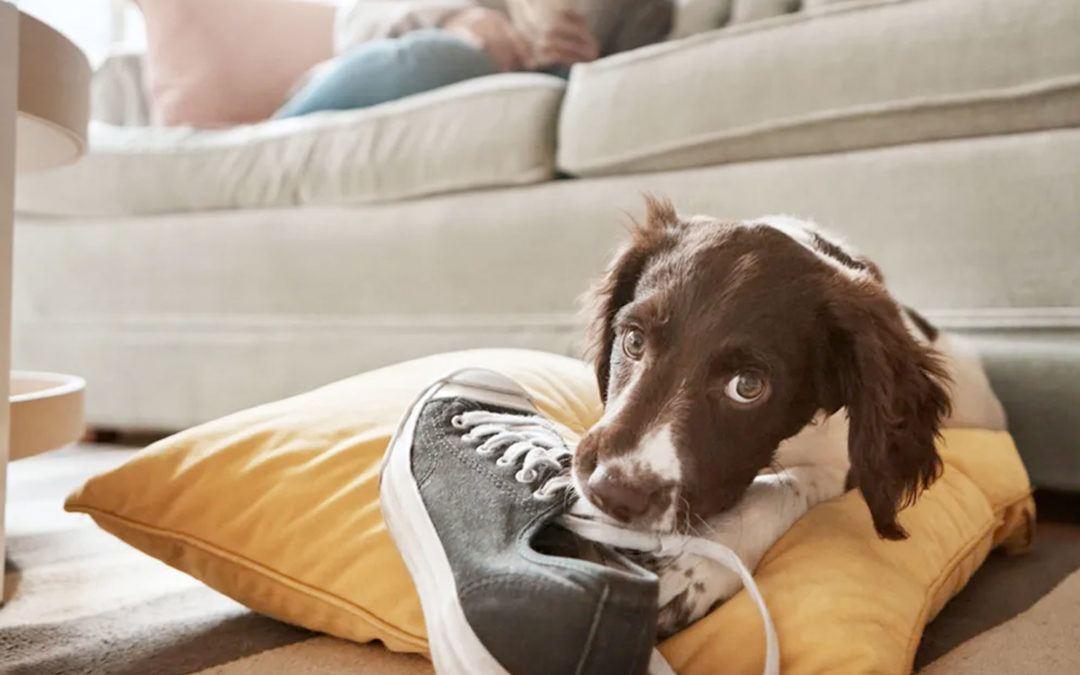Biting things, in general, is one of the most common behaviors in dogs. They are animals that interact with their environment mainly through their mouths , so it should not surprise us that they start using it even when they are puppies. At that early age, precisely, you should begin to teach your dog what is correct to bite and what is not.
However, when an adult dog bites everything – furniture, hands, cables, etc. – without control, it is clear that something is wrong. It is a problematic behavior, so in this situation, you should try to understand what the causes are. It is important to understand that a dog does not start biting everything out of malice or to annoy anyone , so you will not solve anything by punishing him over and over again.
The most common reasons why a dog bites everything are youth, changing teeth and, when they are adults, anxiety. Let’s now look in more detail at each of these three situations, which are, as you can imagine, very different from each other.
If the dog that bites everything is a puppy, you should understand that it is going through an exploratory phase that all dogs go through. Lacking hands, the mouth is the only way these animals have of relating to their environment… an environment that, during the first months of their life, generates enormous curiosity. The puppy’s instinct pushes it to bite everything, to try this and that, to push its limits and, ultimately, to explore.
This is a crucial learning phase for any dog, so you don’t want to get angry or punish your dog constantly – this will only confuse your dog. Instead, you’ll need to teach your dog what the boundaries are and what is not acceptable to bite.
To do this, you will need to redirect his attention to toys, chew toys and other similar objects and prevent him from getting into the habit of biting hands, cables, furniture, etc. If you don’t set any limits, you may find that habits that are fun for a puppy (nibbling on a hand, for example) are painful or even dangerous for an adult dog.
When your puppy starts biting something he shouldn’t, just say “NO” loudly, giving him a little scare. If you’re playing, stop the fun or turn your back. Little by little, your dog will start to understand that there are things that it’s not a good idea to bite.
It’s important to remember that for a dog – a hunter, after all – the bite reflex is one of the strongest. If your puppy picks up something he shouldn’t, one of the worst things you could do is to reach out to take it away from him : by doing that, you’ll only turn it into a game for the dog, one that all his instincts will drive him to continue. That’s why we mentioned above the idea of redirecting the dog’s attention: if he bites something he shouldn’t, offer him something he can bite, accompanied by positive reinforcement. He’ll soon understand.
When the dog is about four months old, its milk teeth – smaller and thinner – begin to fall out and are replaced by the adult teeth, the permanent ones. This process brings with it a greater desire to bite, since it is the best way for the dog to relieve the pain and discomfort that it constantly feels.
Every dog has to go through this stage, and the most you can do is find ways to mitigate the pain and thus reduce the urge to bite.
There are all kinds of toys on the market that are specifically designed for this situation, but if you don’t want to or can’t afford them, there are also home remedies. You could, for example, make your dog an ice lolly using water and some kind of food that he likes. The cold will temporarily relieve the dog’s pain, and he will also associate the lolly with the reward he will find inside, so he will always want to repeat it.
Dogs, just like us, can suffer from anxiety, and this is another reason why they might start biting everything.
A dog can develop anxiety for a variety of reasons: spending too much time alone, traveling, sudden changes in routine, etc. If you suspect that anxiety may be your dog’s problem, the first thing to do is to identify the cause.
We mentioned loneliness first because it is usually one of the most common reasons. In general, being left alone is something that all dogs do not like, since it goes against their nature – they are sociable and gregarious – but we already know that each animal is different: some dogs will learn to be left alone without any major problem, but others will suffer a lot and could develop destructive behaviors such as, for example, biting everything they find.
The first thing to understand is that leaving your dog alone is something that should only be done for reasonable periods of time, a few hours. A dog that spends days alone will suffer greatly, regardless of the measures you take to prevent it from becoming destructive. You should never forget that when a dog has anxiety, the habit of biting everything will not be the problem, but a symptom .
That said, when you leave your dog alone, make sure he is tired and as relaxed as possible. To do this, whenever possible, take him for a walk just before leaving him alone. Make sure you also leave his favourite toys around the house and, if that is not enough, prepare stimulating games to keep him busy.
If the dog’s biting habit is very strong, you can combine these measures with other corrective measures, such as applying an unpleasant substance to the furniture or areas that the dog tends to bite.

